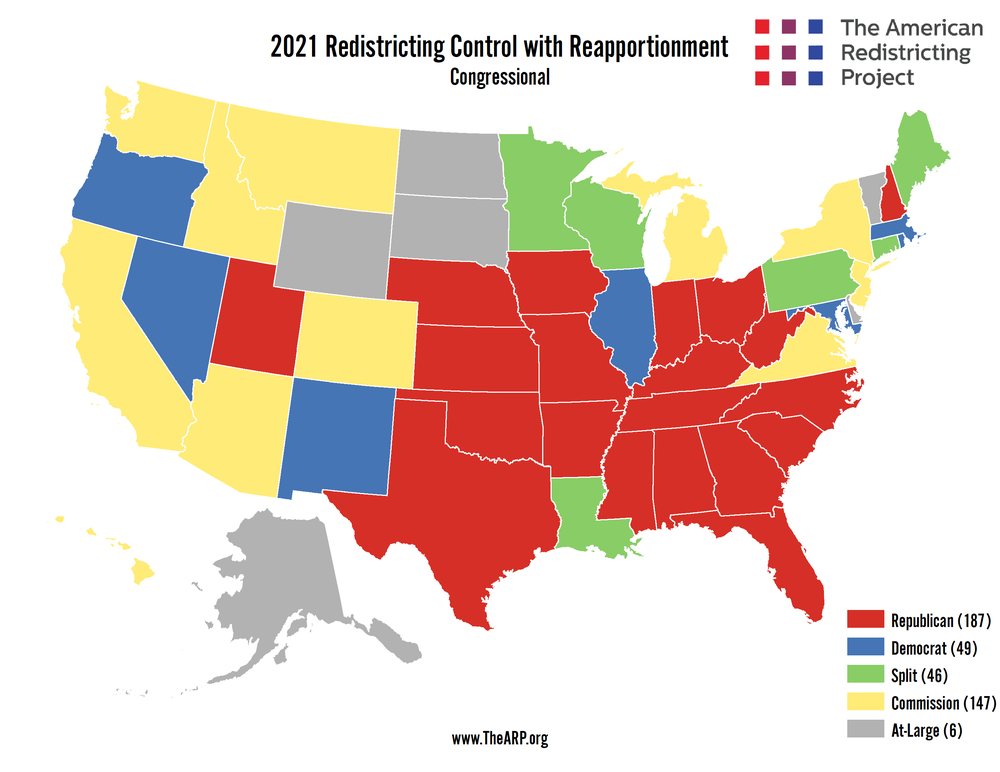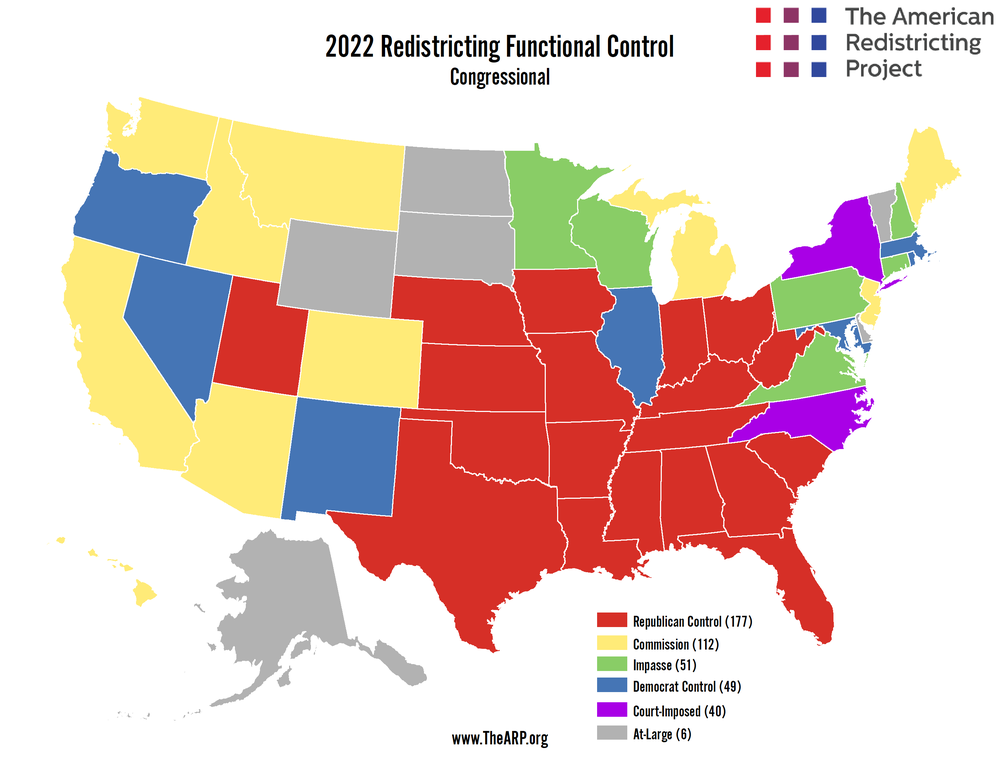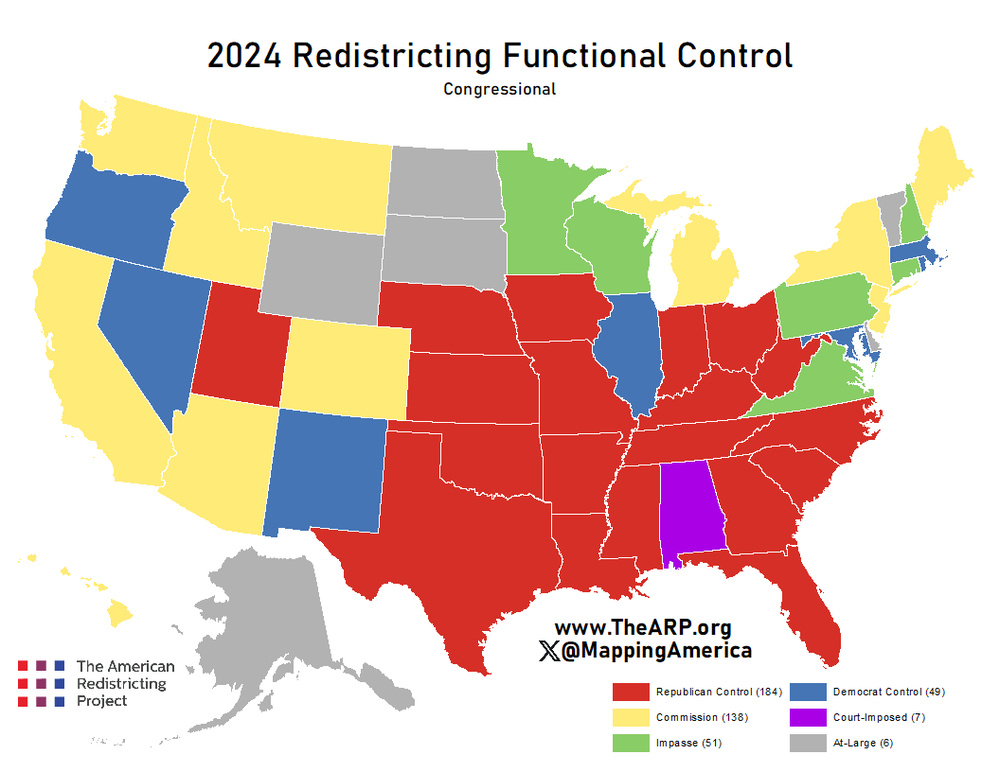EXPECTATIONS
At the beginning of the 2020 redistricting cycle, we published a blog post detailing who controlled the redistricting process in each state. But the realities of the cycle - from process failures to in-state politics to the results of litigation - upended many of these mapping expectations.
The map below shows expectations at the outset. Republicans controlled 20 states with a total of 187 congressional seats and Democrats controlled 7 states with a total of 49 congressional seats. 6 states with 46 congressional seats were under split-control, meaning no party had sole control over the state's government, while commissions controlled 11 states with 147 congressional seats. The remaining 6 states were at-large with only one congressional district each.

2022 REALITIES
After redistricting concluded ahead of the 2022 midterms we modified control for six states to align with the realities at the time. Louisiana Republicans overcame a Democrat governor's veto, New Hampshire and Virginia had their redistricting processes break down so courts had to step in to break impasses, Maine's commission succeeded in producing a plan, and New York and North Carolina had maps imposed by courts following litigation. The full 2022 post is here. Republicans ended up drawing 10 fewer seats than expected and commissions under-performed by 35 seats.

2024 CHANGES
ALABAMA: REPUBLICAN TO COURT-IMPOSED
Alabama's enacted congressional map was enjoined by a three-judge court for violating Section 2 of the VRA ahead of the 2024 elections. The Supreme Court affirmed that decision in its 2023 opinion in Allen v. Milligan. Alabama then enacted a new map to attempt to comply with Allen, but the three-judge panel enjoined the second map too. The new map is now the subject of ongoing litigation. Alabama used a court-imposed map for the 2024 elections and that plan remains in effect at this time. Alabama moves from Republican-controlled to court-imposed. It was the only state in the country that used a court-imposed map resulting from litigation in the 2024 elections.
NEW YORK: COURT-IMPOSED TO COMMISSION
The New York Court of Appeals ordered New York's Independent Redistricting Commission to re-form and create a new congressional map for New York for the remainder of the decade. The commission succeeded and produced a map that was then modified by the legislature. While there does remain disagreement on whether or not the modifications by the legislature complied with the constitution the map was by-and-large the product of the IRC. New York moves from a court-imposed state back to a commission state since New York's constitutional process was used in 2024.
NORTH CAROLINA: COURT-IMPOSED TO REPUBLICAN
North Carolina's court-imposed map was replaced with one enacted by the Republican-controlled legislature ahead of the 2024 elections. That map is the subject of litigation, but remains in place at this time. North Carolina moves from court-imposed back to a Republican-controlled state.
2024 NON-CHANGES
GEORGIA: STAYS REPUBLICAN
Georgia had its enacted congressional map enjoined by a federal judge. The state was given an opportunity to redraw. The Republican legislature enacted a new plan to comply with the judge's order while it pursued an appeal. The district court judge approved the new map and Georgia used it for the 2024 elections. Georgia remains a Republican-controlled state as a result.
LOUISIANA: STAYS REPUBLICAN
Louisiana became solidly Republican after its 2023 elections when the state elected a Republican Governor and Republican legislative supermajorities. Louisiana Republicans then enacted a racial gerrymander that a three-judge court of the Western District of Louisiana found violated the Equal Protection Clause of the 14th Amendment. The Governor and Attorney General claimed the map was drawn to appease a district court judge who they believed was certain to rule against them, but at the time the state chose to redraw there was no court-order in place requiring it. The Supreme Court, citing Purcell, allowed Louisiana to use its unconstitutional racial gerrymander for the 2024 elections. Republicans drew Louisiana's new map so it remains a Republican-controlled state.
FINAL 2024 REDISTRICTING CONTROL
The map below shows how redistricting control actually played out ahead of the 2024 elections. The final count has 19 states with 184 congressional seats controlled by Republicans, 7 states with 49 congressional seats controlled by Democrats, and 11 states with 138 congressional seats controlled by redistricting commissions. 6 states with 51 congressional seats had impasses, and 1 state with 7 congressional seats had court-imposed redistricting plans. The final 6 states remained at-large.

